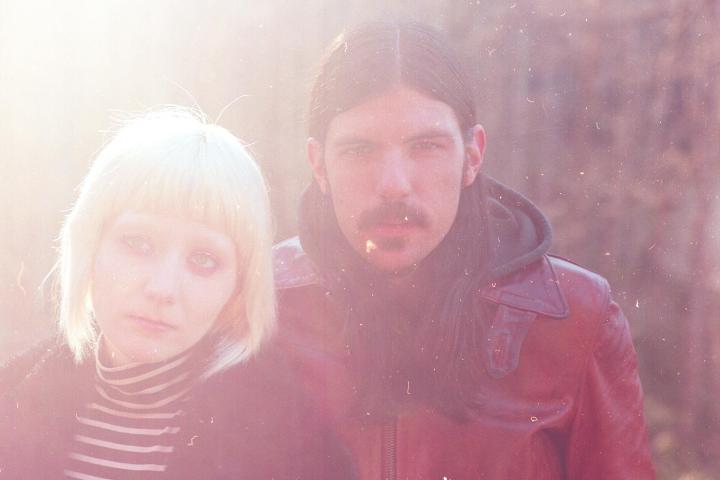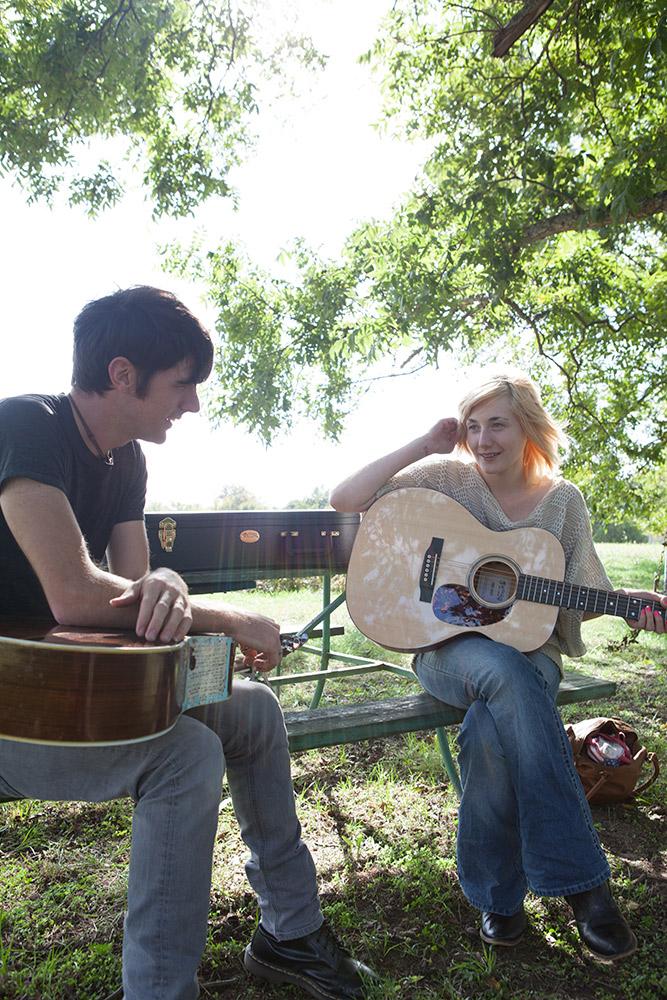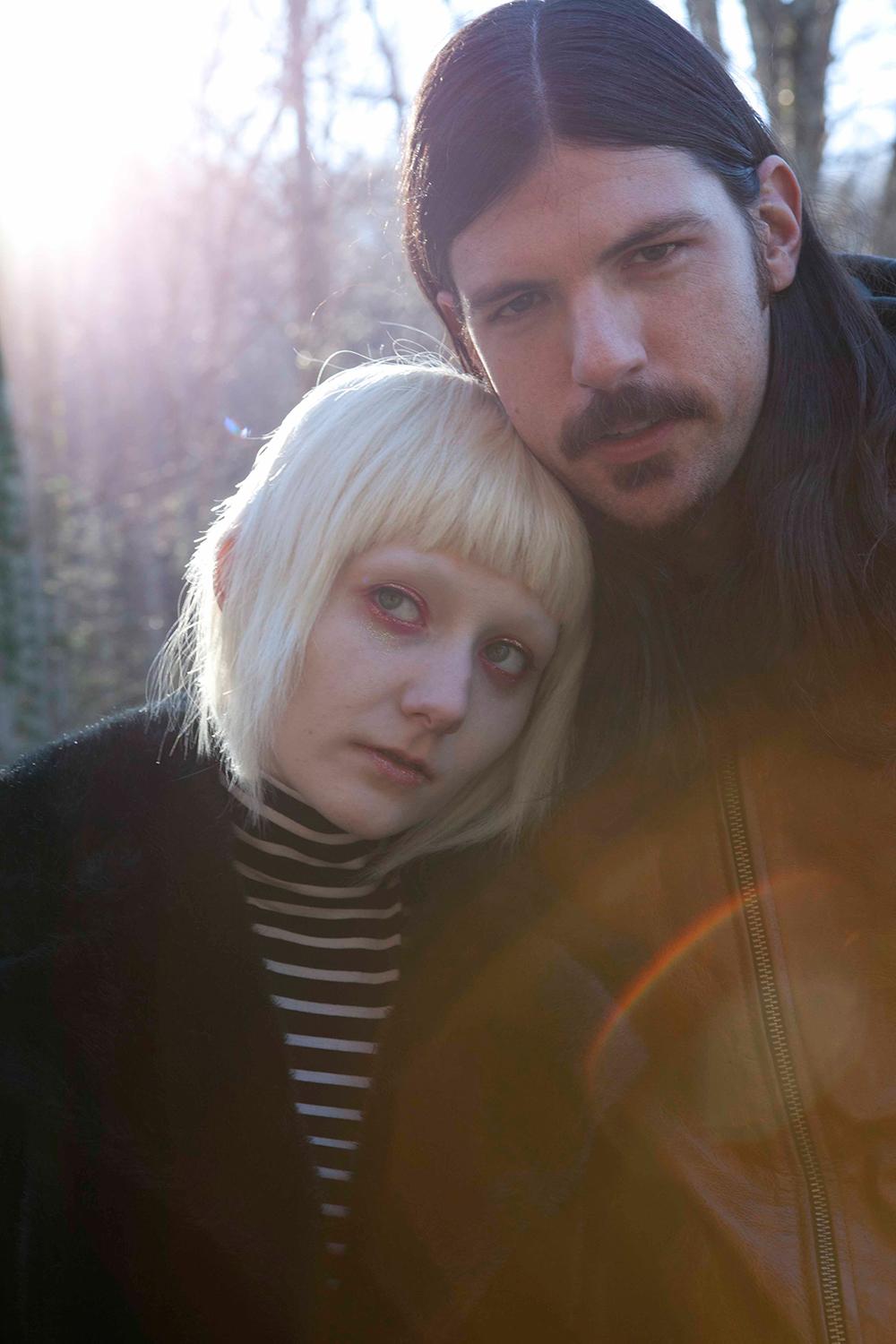
“It’s all about the performance and the moment. That’s the more fundamental part of his songs. And I believe we took care of his songs quite well.”
Seth Avett is talking about Elliott Smith, one of the most captivating singer/songwriters to emerge in the ’90s. Smith’s direct, acoustic lo-fi approach and whispery vocals made it feel like he was singing directly into your ear on songs like Miss Misery (you may recall hearing it during the final scene of Good Will Hunting), Say Yes, and You Make It Seem Like Nothing. Ever a tortured soul, Smith passed away tragically in 2003 at age 34, and his reputation has only grown since then.
Two of our most heartfelt performers have joined forces to plug directly into Smith’s vibe — namely, Seth Avett of beloved indie folk-rockers The Avett Brothers and the haunting minimalist songwriter Jessica Lea Mayfield (a favorite of The Black Keys’ Dan Auerbach, who produced her 2008 album, With Blasphemy So Heartfelt). Their harmonic partnership shines on the starkly beautiful Seth Avett & Jessica Lea Mayfield Sing Elliott Smith (Ramseur), out today on various formats. Uncluttered arrangements and intimate vocal readings bring the essence of songs like Let’s Get Lost, Angel in the Snow, and Pitseleh to the forefront of Avett’s mixes. “It was more a question of not getting in the way of the songs,” he says. Adds Mayfield, “We sang these lyrics that are so incredible in a way that portrays them differently.”
Avett and Mayfield also did Smith proud live at Town Hall in New York last Thursday, joined by standup bassist Paul Defiglia. They played on a stage set that resembled a mid-century rural kitchen, complete with white refrigerator, peeling wallpaper, and a working stove that Mayfield used to warm up a refill of her tea while Avett took a solo turn on one of Smith’s most touching tunes, Angeles. (The tour continues through the end of March.)
Digital Trends got on a conference call with Avett, 34, and Mayfield, 25, to discuss their mutual deep connection with Smith’s music, their surprising (and possibly shocking) first-album purchases, and what their respective future plans are (spoiler alert: there’s a new Avett Brothers album in the works). These songs will kiss your ears between the bars.
Digital Trends: Because Elliott’s songs are so personal and emotional, did you want to be true to that spirit with the production of this record?
Seth Avett: I think it was more a question of not getting in the way of the songs. Jessica and I both have attempted in our own recording processes to achieve maybe some of the same things Elliott Smith did where there’s an honesty, an empathy, and a quietness. It’s so what we hear in the music and what we’re attracted to. I can’t imagine attempting to record some of his work and being naturally inclined to overcomplicate it.
“There was very little overthinking with this process.”
Jessica Lea Mayfield: I feel like Seth has this way of, like he said, not getting in the way of the songs and doing them real natural. We were trying to find where things were more our speed and more natural for us, and not so much trying to emulate Elliott Smith. We sang these lyrics that are so incredible in a way that portrays them differently.
Were you recording in the same room most of the time? What was the setup like?
Mayfield: We started it at Seth’s garage studio in Concord [North Carolina]. He drove up to Ohio and we worked on it some here at my house, and then we finished it up at Echo Mountain Studios in Asheville [North Carolina].
Avett: Echo Mountain has its own very alive and very authentic sort of vibe. It’s a full-on, fully functioning upper-echelon studio with a Neve console. We only really did the one session at Echo; the rest was at our homes.
Mayfield: You did some useful things when I wasn’t around. That would be kind of fun, because when I would get a chance to meet up with Seth, he would go, “Well, I added this,” and then he’d send me something I hadn’t heard. But most of it — we sang everything together.
Did you make decisions as to who starts a song, who comes in on the harmony, and things like, “I’m going to sing more of this verse than you are…”?
Avett: I’m just starting to recognize right now how little Jessica and I really talked about this process. From the outside, you’d think there’d be this ongoing conversation about how, “I’ll do this, and you’ll do that,” or whatever — some of that happens, but much less than you might actually think.

Mayfield: It was things like, “Oh, I’d really like to hear Seth sing this.” And he’d go, “Oh, I thought you’d do that — you’d be singing this, and that would be cool.” And then one of us would sing it and the other would go, “No, you sing it.” (chuckles) A little trial and error.
Avett: Right, trial and error. Our conversations about who would be doing what probably sounded more like high school kids talking about music rather than two professionals. (all laugh)
But isn’t that the way professionals work? (all laugh) While you do sing most of the songs together, toward the end of the record, we get Angeles, with Seth doing his own thing and singing it solo.
Avett: Again, there was just a sort of natural sway with all of this. As soon as the “solution” presented itself, we recognized it, moved on, and that was it. I believe on that one, Jessica said, “I like that with you doing it just by yourself.” And that was more like, “Cool. Moving on.” There was very little overthinking with this process.
Mayfield: It’s one of my favorite songs off the record, and I’m not even on it. It’s beautiful.
Avett: That’s a good example of the overall mentality on this thing. If it were up to me, when we started it, I would just have Jessica sing every song. For the sake of the dynamic and the textural variety, we ended up spreading out a little bit. Jessica trusted me a lot with it, and I trusted her a lot with it.
I believe we took care of Elliott’s songs quite well. We definitely kept it pretty simple, on all sides.
The songs kind of dictate that you have to be honest with them. For me, as a listener, especially because the material is so direct, I really want to hear this music in the best way possible. Do you have any thoughts about high-resolution audio, and wanting people to hear a 96/24 download instead of an MP3 so we can get all of the vocal and instrumental detail?
Avett: My personal take on this is proven by how we started on this process in my garage studio. Clearly, I am more concerned with the moment and the performance than I am with the sonic quality. We ended up with something that, fidelity-wise, is very strong, but is also in the spirit of Elliott Smith’s recordings. A lot of his earlier stuff is not the sound of a pro in a studio with a pro engineer with a pro mastering technique and a perfect mix. It’s about the performance and the moment. That’s the more fundamental part of the songs.
Mayfield: The quality of the record sounds great. You can’t really decide how other people will listen to music, so much as they should just listen to us and not overthink it too much.
Avett: Well said. Well said.
I am looking forward to hearing this album on 180-gram vinyl.
“Clearly, I am more concerned with the moment and the performance than I am with the sonic quality.”
Avett: The vinyl version sounds better. What are you gonna do? I’m not going to tell everybody, “Hey, you should go get a turntable and buy some really nice speakers and a nice receiver!”
Mayfield: “You should stream this on YouTube!” (all laugh)
“Spend no money and enjoy!” Well, don’t do that. (all laugh) What was the very first record the two of you got as kids, the first one that may still have impact with you?
Mayfield: Um, the first record I ever bought for myself was Metallica’s Reload, in ’97. (chuckles)
Oh yeah? Wow. So is that your next covers project?
Avett: There you go!
Mayfield: Oh man, we need to do some older Metallica stuff!
Avett: Oh, good God. (all laugh) On the topic of cover records we should probably do, the first cassette tape I ever bought with my own money was David Lee Roth’s Skyscraper (1988).
Mayfield: Nice.
Ok, so who gets to take those wild Steve Vai guitar solos?
Avett: Um, not me. (more laughter)

I think that’s a mashup album right there: Reload Skyscraper. Pair up The Memory Remains with that one hit song of Dave’s —
Avett: Yeah! (Sings), “Just like living in paradise.”
Just Like Paradise. All right, we’ve got your next project underway.
Avett: That’s pretty good, man.
Mayfield: It’s already rolling.
OK, back to Elliott Smith. The next-to-the-last song, Roman Candle, features a full band, and that seemed like a pretty deliberate choice to put that one at the end of the record when most everything else we heard before it was pretty sparse.
Avett: Yeah, yeah. I think it goes back to what you were saying — there was a hope to sort of take a journey. I feel like it made a bit of sense in the sequence to have a bit more “active” moment there. Maybe, in retrospect, it was about bringing the drama to the very last moments of the record.
And that leads right into the final song, Memory Lane, which has some beautiful strings on it. Twilight has strings too, some nice piano, and a little banjo from your brother [Scott Avett]. Actually, I think Twilight is my favorite piece on the record.
“You can’t really decide how other people will listen to music, so much as they should just listen to us and not overthink it too much.”
Avett: Twilight was the first song we figured out. That was sort of the spark for the whole project. There’s a certain love I have for that one as well. It’s always going to be very singular and very powerful, every time. That song, and Jessica’s voice — it’s sort of an obvious starting point to me. Of course, that’s the motivation to make and follow through on something.
You guys met at an Avett Brothers performance at Kent State in Ohio a little over a decade ago, when Jessica opened for you. Did you know right away you guys had a musical bond? Was it an instinctual thing?
Mayfield: I haven’t really ever thought about that before getting this question. We didn’t necessarily hit it off the first time we met. We probably didn’t technically become friends until 2009. Yesterday, somebody asked me why Seth was my friend, and I don’t know why he associates with me, or continues to. (both laugh) I think he’s a wonderful, wonderful gentleman, and I enjoy making music with him.
Avett: And that’s it, man. Number one, thank you, Jessica, you’re the best. When you think of your best friends, it’s funny how, when you’re put to the test of explaining or describing why they’re good friend, you just can’t.
Right — in some cases, it’s just something you know. Simple as that.
Avett: Yeah. Jess and I making music together seems unavoidable in some ways, and, of course, it’s made more unavoidable in how I push to make that happen. (both laugh) It seems very natural, and it’s sort of an extension of a good friendship that seems like it should be. There are friends you have in your life that are just going to be your friends, you know? You’re going to be friends with that person whether you like it or not. And fortunately in this case, I like being friends with her. It makes it very convenient that she’s also an incredible singer and songwriter as well.
Mayfield: Thank you.
Seth, is there one song of Jessica’s where you went, “Ok, that’s the one”?
Avett: Yeah, actually, I’ve had a lot of those moments with Jessica. I mean, This person started writing incredible songs at age 14! Initially, I guess the first one where I went, “Oh, wow, yeah,” was when [my brother] Scott played For Today [from her 2007 White Lies EP]. And I went, “Wow, OK, I can’t believe how good this is.” It’s just a quality song no matter how you slice it.
I remember I had a major moment with the song Sometimes at Night [from 2011’s Tell Me]. I was driving through some pretty backwoods area in the mountains of North Carolina and was coming up to a very sketchy grocery store, and I had this moment with that song where the chorus really hit me. I can’t pick just one; I’ve had a lot of them. With songwriters you really connect with, you have these kind of big discoveries very often. I had one in my studio the other day when Jessica played me a new idea. I went, “Oh man, that’s a really interesting concept.” It just keeps on happening.
Let’s throw the question to you, Jessica. What did you hear of Seth’s work that did the same thing for you?
Mayfield: That’s interesting, because I heard Seth with The Avett Brothers first, back in the early 2000s. That was the first time I heard y’all, when I got asked to open for you guys. I got on the Internet and went, “OK, what do these guys sound like?” And it was definitely something really cool, and really different.
“I’m not going to tell everybody, ‘Hey, you should go get a turntable and buy some really nice speakers and a nice receiver!’”
Things really changed when I heard Seth’s solo music. (pauses) God, when I first moved into this house, I had two of your CDs — To Make the World Quiet (2001) and Killing the Headlamps (2002). I don’t even know where the cases are; they’re in a drawer somewhere. When I moved into my house, my house was empty. My dining room had a boombox, there was a mattress on the floor of the living room, and that was it. The house was just crazy. The boombox had a three-CD changer, and it had his two CDs in there. And I just played them for weeks and weeks upon end.
Avett: I never knew that. That’s incredible.
Mayfield: Yeah. I spent so much time with Killing the Headlamps that when I do listen to it now, there’s a certain nostalgia that comes with it from the time period where I listened to it so much. Do you know what I mean by nostalgia?
Avett: Oh yeah, it takes you back to a time. I’ve got that for some of Jessica’s work. I have that for the record Tell Me (2011). All of us on this phone call have music that we listen to and can’t help but go back to a time or a place.
Mayfield: Elliott Smith, he makes me think of my early teens. Whenever the seasons come back around, there are certain Elliott Smith songs I want to hear. It’s never changed to something else.
Last thing for both of you, as far as future plans go — I understand we’ve got an Avett Brothers record coming, Seth, is that correct?
Avett: It is correct, yeah. Hopefully, it’s probably 75 percent there. We’ve pretty much agreed to all of the things we’re going to do this year, I think. It’s looking at sort of an early next year release. We have to carve out the time to finish it.

Could you describe what it sounds like to you so far?
Avett: Um, oh man. I’m going to fail, I can tell. Every song feels like a completely independent journey with its own inspiration, its own struggles, and its own kind of beautiful moments. I can’t see it [the album] yet as one piece, but it’s on its way.
We’ve never been so open and so able to get to the heart of the meaning of a song, but I don’t know how to explain what that means aesthetically. It’s still us, but now we’ve got all these tools. Like, we’ve got a string quartet within the band now. And then we’ve got this heavier thing that’s happening, and then we’ve got this even-keeled sort of rock thing that’s happening. Basically, I don’t know how to answer the question.
Oh, I think you answered it pretty damn well! To me, it sounds like you guys are continuing to evolve as artists. Jess, how about you — what are you working on after this?
Mayfield: The main thing is, I don’t have my whole year planned out. As a matter of fact, I’ve planned to not have my whole year planned out. (all laugh) I keep fighting for, “And then I need this much time to do ‘nothing,’ so I can work on things and know what my ideas sound like out loud.” That’s what I’m doing.









